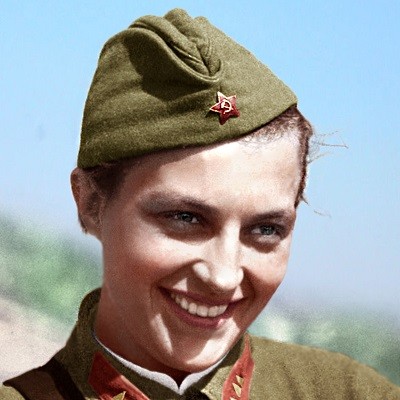The following, for example, is related by F. I Kalugina, an old-age pensioner, 78 years old, formerly employed at the Pyotr Alexeyev Textile Mill in Moscow, and now living in the home of aged working women organized at that enterprise: "I am an old textile worker. Under the tsar I lived in dire poverty and degradation. Since the mill owners and landlords were overthrown my life has been a happy one, and in my old age I am free from care and worry.
“We old folks here are quite a happy family, living in cleanliness and comfort. We cannot be grateful enough to our Soviet Government and to Comrade Stalin for all this-the good food and clothing, the bright, clean, warm rooms, with comfortable furniture-couches, wardrobes,sideboards, carpets, flowers-everything one could wish for.”
And how was the life of a worker under Tsarist rule?
In former Russia things were entirely different. Anna Maximovna Pavelyeva, a veteran worker at the Krasny Bogatyr Plant, relates the following:
“Happily, our children and grandchildren are not experiencing the burdens and privation that we old workers had to put up with in the old days before the Revolution. If any of us fell sick we dragged ourselves to work just the same. What else could we do? We got no assistance when we were sick, and if we stayed away from work for more than a couple of days we lost our jobs. The -old people had a particularly hard time. If a worker became too old to work there was nothing left for him to do but go begging. Nobody helped him, neither the state nor the factory owner for whom he had sacrificed his strength.”
These words, spoken from the heart, vividly reflect the inhuman and unbearable conditions of the working people of tsarist Russia. This life of torment and suffering was swept away forever in October 1917. The Great October Socialist Revolution,which established the Soviet regime in Russia, gave the working people not only freedom, but also material benefits, the possibility of leading a prosperous and cultured life.


My little sister’s grandmother was born in the 1920s in Warsaw, Poland. I got a chance to sit down and talk with her about a whole host of things. She vividly recalled growing up in Poland while it was an independent state, she remembered the hardships, she remembered the cruel environment, she remembered the outbreak of the war. She was in Warsaw during the war, she recalled the Nazi occupation. Their heartless treatment of the Polish people, their oppressive regime - somehow worse than the independent state was. She spoke to me about January 1945, and the years that followed. She had up to that point lived in extreme poverty, being treated as property, it was a miserable existence for her - a beautiful and young Polish woman. But as soon as the Soviets liberated Warsaw, they brought with them feminist liberation, they brought Socialistic economy, they turned Poland from a depressing hell-land to a place she could actually grow to enjoy. For the first time in her life, she didn’t have to do heavy labour to feed herself, she didn’t have to worry about medicine or employment. The Soviets improved her life in such a short amount of time, she couldn’t believe it.
Granted, she also remembered the bad side of Poland-SR. But, in contrast to the previous state, and further in contrast to the state that followed it, Poland-SR was heavenly. When I visited last - and she’s died since - she still had the Poland-SR flag hanging in her dining room, and a picture of Stalin in her living room. Though, she was never a party member or a true communist, she had nothing but admiration for Stalin and the USSR, and nothing but fear and depression for the states that followed its fall.
Beautiful story comrade!
This reminds me of a story I heard from a co-worker about some Russian grandparents he knew that would still sing the Soviet national anthem with the Stalin era lyrics. We had a good conversation about how you can generally tell whether someone came from a rich or poor background when they immigrated from a socialist/communist-led country